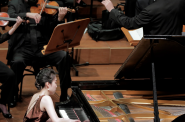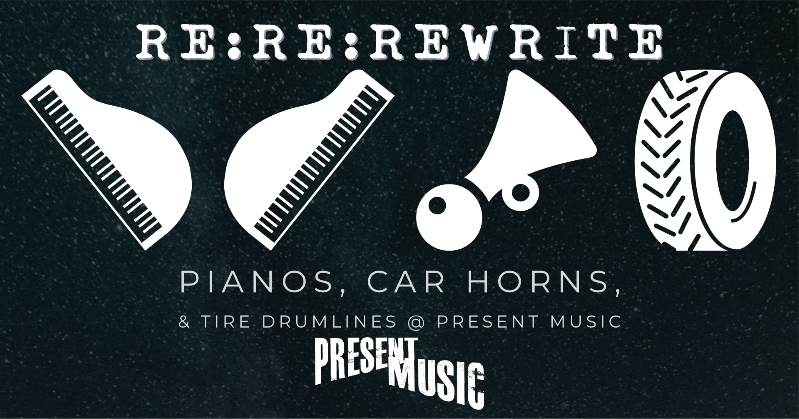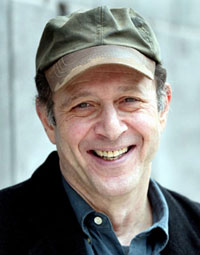Linking Rock to Classical, and Vice Versa
Present Music mixes Steve Reich and Radiohead, Rhiannon and Kronos, Ligeti and taxi horns.
Present Music opens its 38th season with RE: RE: REWRITE, an exploration of inspiration and the creative process in contemporary music. Jointly curated by Artistic Directors, David Bloom and Eric Segnitz, the program draws its inspiration from composition inspired by other compositions. The event will be held Saturday evening at the UW-Milwaukee Helene Zelazo Center for the Performing Arts.
The evening features a work by Steve Reich, who in turn inspired several of the other featured composers. Writing in The Guardian, music critic Andrew Clements suggested that Reich is one of “a handful of living composers who can legitimately claim to have altered the direction of musical history”. Reich’s use of repetitive figures, slow harmonic rhythm and canons can be heard in several of the other selections.
Several works reflect broad musical influences. Reich’s featured work, Radio Rewrite, is inspired by two songs by the rock group Radiohead – “Jigsaw Falling into Place” and “Everything in its Right Place.” Segnitz observes that this group is a frequent favorite among classical composers. Radiohead performances are not locked into rock and roll formulas. Their stream-of-consciousness, psychological themes have an edgy appeal. The mood of the Radiohead works permeates the Reich composition, although the style is entirely recognizable as Reich. Present Music will also perform the song “Everything in Its Right Place.” But the original has been modified again for the ensemble by Segnitz as “Everything in it’s Reich Place.”
A folk-blues song by Rhiannon Giddens, “At the Purchaser’s Option“, was inspired by a slave auction ad offering a woman for sale. Her child was available “at the purchaser’s option.” The contemporary string quartet, Kronos, commissioned an adaptation. The result retains most of the melody and rhythm of the original. The mood and the melody carry over well in the wordless adaption. This performance will reintroduce the words as well.
In the first instance, Gyorgy Ligeti adapts a toccata for brass by Claudio Monteverdi to a battery of tuned taxi horns as Car Horn Prelude.
In the second, Brandenberg Interstices by Gabriella Smith reflects on the harmonics, rhythms and instrumental sounds of Bach to create a companion work for Bach’s Brandenburg Concerto No. 5. Segnitz reflects on contemporary composition practice. “Smith was able to find the soul of Bach without making it an adaptation. More technology is involved. Composers can create layers, reconsider a phrase, apply software algorithms.” The result was then orchestrated for traditional instruments.
Christopher Cerrone composed South Catalina, a dynamic piece inspired by a contemporary light exhibition by the art collective rAndom International. Their computer-driven matrix of lights imitates a swarm of birds. Cerrone explains that he envisioned a work “where sharp and loud attacks in the piano and percussion would inspire a flurry of wild and improvisatory gestures from the rest of the ensemble.”
Wisconsin native Caleb Burhans wrote Escape Wisconsin for solo saxophone. The solo work, with short rapidly changing phrasing, is an exciting composition. Present Music commissioned a rewrite of the solo version for ensemble to receive its world premiere at this concert. The work is transformed when 11 instruments share in its development.
Works by Nico Muhly and Arvo Part round out the program.
Listening to a sample of the selections, I find the concert to be uniformly interesting. An attractive melody, a memorable rhythm or a mood created by the original reminds me of why I like the source of inspiration. When a composition inspires a composer, the new work inherits some of the attraction of the first. Follow links above to check out the inspirations and the results on YouTube.
Many choices often represent a coming together of classical and popular music worlds. “The concert hall is one or two steps behind where music is consumed in popular culture,” Segnitz suggests. “Classical groups have to be focused on bringing culture to the concert hall. And we need to reverse the context and take the concert to the culture.” This seems to be the challenge for Present Music, entering a new phase after 37 years under the leadership of founder Kevin Stalheim.
Following the concert, stick around for a chance to talk with new Co-Artistic Directors, David Bloom, and Eric Segnitz.
RE: RE: REWRITE begins at 7:30 p.m. Saturday at Helene Zelazo Center for the Performing Arts, 2419 E. Kenwood Blvd. Single tickets are $55 (Preferred) and $25 (General Admission). $10 tickets are available for “special industry, artists and musicians.” Discounts, subscriptions with additional ticket options may be arranged. Purchase individual tickets online.
Next, Present Music returns to a familiar setting, Cathedral of Saint John the Evangelist, on November 17, 2019 for a celebration of thanksgiving with a traditional contemporary ambiance. The new management promises the usual drumming, choral music along with selections by composers Caroline Shaw, Shelley Washington, and local talent, Lauren Barta.
Preview
-
PianoArts Festival Features Rising Stars
 May 28th, 2024 by Michael Barndt
May 28th, 2024 by Michael Barndt
-
Four Nations Ensemble Goes For Baroque
 May 13th, 2024 by Michael Barndt
May 13th, 2024 by Michael Barndt
-
Mozart on Prospect Avenue
 May 9th, 2024 by Martha Brown
May 9th, 2024 by Martha Brown






















